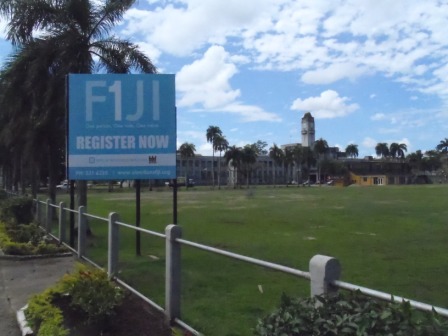Fiji - a military dictatorship

VulcanSpirit
Richard & Alison Brunstrom
Wed 26 Sep 2012 20:40
|
Fiji is a hugely interesting place. There are about
200 000 Fijians living on over 100 islands (the main island is very large
by our previous Pacific experiences - the airport is 190km from the capital,
Suva), a British possession until independence in 1970. The native Fijians are
mainly Melanesians (much darker people than the Polynesians seen further east)
who got here from the west via Indonesia rather than from Taiwan to the north.
But half the current population are Indians whose ancestors were brought here
from India by the British regime as indentured workers in the sugar industry.
And here lies the origin of Fiji's current problems - and relative
wealth.
Fiji has had four (almost bloodless) military coups
since independence - in 1987 (twice), 2000 and 2006. And in 2009 the President
annuled the Constitution and dismissed the entire High Court for inconveniently
ruling the government since 2006 to be illegal. Fiji has rightly been expelled
from the Commonwealth and local international Pacific community. The
problem lies in ethnicity and associated land tenure, both issues a legacy from
British (mis)rule.
Fiji became a British colony in 1874, at which time
Fijians were still cannibals, strongly organised in tribes under chiefs. The
native Fijians didn't want to 'work' in the British fashion (and most still
don't) so the British imported the Indians, who would, and did. So
many Indians were imported that the local culture was in real danger of being
overwhelmed. The British administration did two things to try to resolve the
situation, but in doing so they created the conditions leading to the current
military dictatorship. Firstly, they froze land ownership in 1909 with the
result that today 83% of the land is owned by native Fijian communities; and
secondly, they created two separate race-based electoral rolls, a concept
which lasted even into the ill-fated 1997 Consitution.
These two issues conspire to keep politics
race-based and ugly, with real contention over land ownership. The native
Fijians have largely remained as subsistence farmers, while the industrious
Indians have taken over most of the modern economy - a further ongoing cause of
friction.
But perhaps there is hope. The current government
has promised free elections in September 2014 (don't they always, the cynic
might say) and an international constitutional commission is due to report in
January 2013 - its labours are fully reported in the press. There is a new
electoral commission, who as you can see below are busy recruiting voters
for the new one person one vote race-free electoral roll:
 In the background is the well-used national cricket
ground, and the government buildings.
But perhaps the most surprising thing is that the
people, of all types, are far and away the happiest and the most helpful and
friendly that we have met literally anywhere so far. The infrastructure
works, the streets are clean and tidy and the economy seems strong (by UK
standards!). Modern IT is everywhere (you may not be able to see in the photo
that the electoral commission has no address, just a website), and the shops are
full. Perhaps temporary authoritarian rule has something to recommend it?!
And the people are thin, even the ethnic Fijians -
nothing like the gross lumps that inhabit Polynesia. And there are Indian
restaurants again at last! There is almost no political reporting, right of
assembly and free speech are curtailed - but the people will talk openly
to us about all this, and hold out real optimism for the
future.
We love it.
|